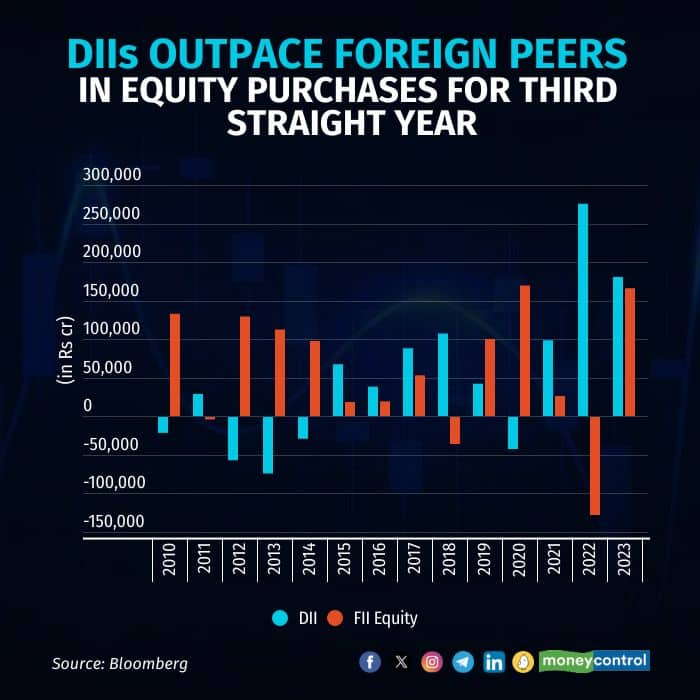



Domestic institutions continued to play 'The Wall' for the Indian equity market, beating their overseas peers in buying local stocks for the third year in a row and serving as a great stabilising force whenever foreign investors went on a exodus.
So far this year, the domestic institutional investors (DIIs) have net purchased around Rs 1.81 lakh crore of stocks, compared to Rs 1.66 lakh crore pumped in by foreign portfolio investors (FPIs).
After withdrawing over Rs 1.27 lakh crore in 2022, the FPIs turned net buyers this year on hopes that the US Federal Reserve was done raising the rates and would start reversing soon.
Over the past decade, FII inflows have surpassed those of DIIs only for three years, in sharp contrast to earlier times when foreign flows determined the trajectory of Dalal Street.

The unabated DII flows stem from three sources. The first is domestic mutual funds, which are getting more than Rs 15,000 crore per month through the systematic Investment plan (SIP) route which has emerged as the top instrument for equity exposure for the average retail investor.
The Indian mutual fund industry has seen a 125 percent surge in net inflows and around 24 percent growth in assets under management (AUM) since the beginning of this calendar year. The AUM of the domestic mutual fund industry has reached the historic Rs 50 lakh crore mark.
Insurance companies are the second major source of DII flows. With rising awareness and insurance penetration in the country, insurance players are getting a regular flow of funds in the form of premiums, which is deployed in equities.
Third, provident funds have been allowed to invest a small portion of their corpus in stocks.
Read: Bulls vs Bears 2024 | Popular theories on why the rally should continue, and counterarguments
The EPFO began investing in equities through exchange-traded funds in 2015, initially allocating 5 percent of its corpus, which has been stepped up to 15 percent. Government data shared in Parliament showed that in FY23, the EPFO invested Rs 53,081 crore in ETFs, representing over 50 percent of the total gross inflows into equity ETFs in the financial year.
"DIIs are flush with the liquidity mainly because of strong inflows through mutual fund SIPs,” said Sunny Agrawal, Head of Fundamental Equity Research, SBI Securities. “Retail investors now are not panicking at times of market correction. That’s a sign of maturity and an indicator that the inflows through SIPs could remain steady.”
Analysts anticipate a rise in DII buying in local equities on the back of increased awareness of equity investing that lead to greater participation from smaller towns and cities.
“The fundamentals of the Indian economy remain intact which insulated the domestic economy from global shocks,” said Ashwini Kumar, head of market data at ICRA Analytics.
“Continuation of the government’s reform agenda, prudent balancing of the fiscal and monetary policy, end of the global monetary policy tightening cycle and a possible interest rate cut by the Reserve Bank of India if inflation remains under control, will be some of the key factors driving higher inflows into the mutual fund industry in 2024,” he said.
Read: Investors should seriously tone down their expectations for 2024: Radhika Gupta
The year 2023 saw mixed trends in FII investments. They sold in September and October due to factors like rising US treasury bond yields, geopolitical concerns, and Sebi's revised FPI guidelines effective from November 1. These rules demand detailed ownership information for FPIs with over 50 percent Indian assets in a single group or over Rs 25,000 crore in Indian equity.
However, the analysts do not foresee these rules limiting FII buying in Indian markets, given that the economy is among the best placed across emerging and developed markets.
The analysts foresee further rise in Indian markets in the first half of 2024 on the back of likely rate cuts by global central banks as well as the RBI. Another surge is expected ahead of the general elections.
"This makes the emerging market more attractive for investments. Also, the fact that India is one of the large economies expected to grow the fastest in the world has led to greater investment flows in recent months from FIIs," said Sharad Chandra Shukla, director of Mehta Equities.
Disclaimer: The views and investment tips expressed by investment experts on Moneycontrol.com are their own and not those of the website or its management. Moneycontrol.com advises users to check with certified experts before taking any investment decisions.
Discover the latest Business News, Sensex, and Nifty updates. Obtain Personal Finance insights, tax queries, and expert opinions on Moneycontrol or download the Moneycontrol App to stay updated!
Find the best of Al News in one place, specially curated for you every weekend.
Stay on top of the latest tech trends and biggest startup news.